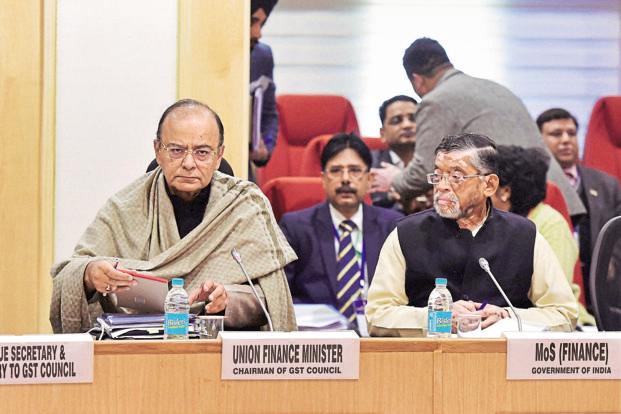Losses due to GST transition may go up to Rs90,000 crore, warns Amit Mitra
Live mint
By Remya Nair | Asit Ranjan Mishra
Wed, Jan 04 2017. 01 37 AM IST
At GST council meeting, states demand increased compensation from centre citing effect of note ban

Union finance minister Arun Jaitley chairs the GST council meeting along with MoS finance Santosh Kumar Gangwar in New Delhi on Tuesday. Photo: PTI
The goods and services tax (GST) council kicked off negotiations on the integrated goods and services tax bill on Tuesday, while putting off discussion on the contentious issue of sharing of administrative powers till Wednesday.
On the first day of the two-day meeting, states including Karnataka, Tamil Nadu, Kerala, Maharashtra, Gujarat, West Bengal and Andhra Pradesh strongly opposed the centre’s proposal to take away the taxation rights of states under GST on transactions occurring in territorial waters extending up to 12 nautical miles from the coast in the IGST bill. The matter has now been referred to the law ministry for its opinion. At present, a substantial portion of tax revenues of coastal states comes from levy of value-added tax on sales of bunker fuels to vessels and on gas explored in territorial waters.
The states also pointed to the increased need for compensation for losses arising from a transition to GST. West Bengal finance minister Amit Mitra said the estimated losses to states from the transition to GST could go up to Rs80,000-90,000 crore from the Rs55,000 crore estimated at present and the centre should ensure that the entire loss for states is compensated.
“The GST council took a decision to create a fund of Rs55,000 crore for compensating states with cess on demerit and luxury. This was the model before the tsunami of demonetisation. Now, everybody’s compensation would go up. We had at that time estimated that at most five states would need compensation as others will manage to achieve 14% growth. But now many more states would need compensation,” he said.
Most states also ruled out GST’s implementation from 1 April.
The eighth meeting of the GST council discussed around 16 sections of the IGST bill with 10 sections remaining, said finance ministers who attended the meeting.
But the council’s nod to the IGST bill will be dependent on the centre and states finding a middle path on the issue of administrative control. While states like Tamil Nadu, West Bengal and Kerala are sticking to their demand for administrative control over all taxpayers who have an annual revenue threshold of less than Rs1.5 crore and equal division between the centre and states for those above this level, the centre is unwilling to yield to this demand as it will leave it only a small taxpayer base of around 700,000 to administer. The other option being discussed was to divide the small pool of taxpayers that are likely to be audited under the GST.
The council also heard representations from various government departments wherein concerns of sectors including banking and insurance, telecom, civil aviation, railways and commerce were highlighted. Government departments and public sector units sought centralized registration as well as lower tax rates under GST.
Commerce minister Nirmala Sitharaman sought lower GST rates for employment-intensive plantation, leather and cement industries and urged not to end duty exemptions for exporters. “Given leather industry creates a lot of employment, we have sought zero GST rate or to keep it at the lowest GST range (below 5%). Given government’s commitment for housing for all and building large-scale infrastructure projects, cement sector also needs to be in a GST rate below the revenue neutral rate of 18%,” she said.
Making a presentation before the GST council, Sitharaman also sought exemption of IGST on goods transferred from SEZs across states. Sitharaman said since SEZs are considered economic zones outside the country’s territory, IGST should not apply on transactions among them.
Kerala finance minister Thomas Isaac said that sectors like telecom, banking and insurance provide services and are seeking special treatment like single registration and lower tax rates. “The council has not taken a final call on single registration under GST,” he said.